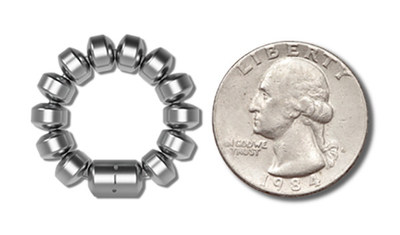The Johnson & Johnson Medical Devices Companies* today announced the results of an Ethicon** clinical study showing that its LINX Reflux Management System, a small band of magnetic beads that surgeons wrap around the esophagus to treat gastrointestinal reflux disease (GERD), was significantly more effective in relieving symptoms
|
CINCINNATI, PRNewswire/ -- The Johnson & Johnson Medical Devices Companies* today announced the results of an Ethicon** clinical study showing that its LINX Reflux Management System, a small band of magnetic beads that surgeons wrap around the esophagus to treat gastrointestinal reflux disease (GERD), was significantly more effective in relieving symptoms and improving quality of life than taking twice-daily acid suppression drugs.
The CALIBER study, the first randomized controlled clinical trial to compare the anti-reflux procedure to proton pump inhibitors (PPIs), the standard of medical care for GERD treatment, was published in GIE: Gastrointestinal Endoscopy, the peer-reviewed journal of the American Society for Gastrointestinal Endoscopy (ASGE).
According to the National Institute of Diabetes and Digestive and Kidney Diseases (NIDDK), about 20 percent of the U.S. population suffers from GERD,1 whose primary symptoms include chronic heartburn and persistent regurgitation. In the CALIBER study, patients with GERD and moderate-to-severe regurgitation despite eight weeks of treatment with once-daily omeprazole, were randomized to either receive twice-daily doses of the PPI or undergo a minimally invasive procedure with the LINX System. The study found:
The LINX System works by correcting a mechanical failure in the lower esophageal sphincter (LES), the body's natural barrier to reflux. The magnetic band expands when a patient swallows to allow food to enter the stomach but then contracts to prevent stomach contents from flowing back into the esophagus. "It is sometimes said that GERD patients who don't respond to medication will not do well with surgery. This study demonstrated that patients experiencing regurgitation despite proton-pump inhibitor therapy actually did extremely well with an anti-reflux procedure, magnetic sphincter augmentation, using the LINX device. When the physiology of GERD is recognized – that it is due to a mechanical defect in the sphincter – it makes sense that patients would indeed respond to the procedure," said Reginald C. W. Bell, MD, FACS,τ study co-author and a gastrointestinal surgeon at Institute of Esophageal and Reflux Surgery in Englewood, CO. "This study demonstrates the LINX System offers significant advantages over medical therapy in patients with GERD who suffer with regurgitation," said Michael del Prado, Ethicon Company Group Chairman. "Ethicon will continue to generate clinical and real-world evidence that enables clinicians, patients, insurers and health systems to make the best possible decisions about which treatments work best for which patients." The LINX System is an effective treatment option that preserves gastric anatomy, establishes normal physiological function, and is reversible. The LINX System is available in the U.S. and throughout Europe. About the LINX Reflux Management System About the Johnson & Johnson Medical Devices Companies About Ethicon Cautions Concerning Forward-Looking Statements This press release contains "forward-looking statements" as defined in the Private Securities Litigation Reform Act of 1995 regarding the Linx Reflux Management System. The reader is cautioned not to rely on these forward-looking statements. These statements are based on current expectations of future events. If underlying assumptions prove inaccurate or known or unknown risks or uncertainties materialize, actual results could vary materially from the expectations and projections of Ethicon, Inc., any of the other Johnson & Johnson Medical Devices Companies and/or Johnson & Johnson. Risks and uncertainties include, but are not limited to: uncertainty of regulatory approvals; uncertainty of commercial success; challenges to patents; competition, including technological advances, new products and patents attained by competitors; manufacturing difficulties and delays; product efficacy or safety concerns resulting in product recalls or regulatory action; changes to applicable laws and regulations, including global health care reforms; changes in behavior and spending patterns of purchasers of health care products and services; and trends toward health care cost containment. A further list and descriptions of these risks, uncertainties and other factors can be found in Johnson & Johnson's Annual Report on Form 10-K for the fiscal year ended December 31, 2017, including in the sections captioned "Cautionary Note Regarding Forward-Looking Statements" and "Item 1A. Risk Factors," and in the company's most recently filed Quarterly Report on Form 10-Q, and the company's subsequent filings with the Securities and Exchange Commission. Copies of these filings are available online at www.sec.gov, www.jnj.com or on request from Johnson & Johnson. Neither the Johnson & Johnson Medical Devices Companies nor Johnson & Johnson undertakes to update any forward-looking statement as a result of new information or future events or developments. * The Johnson & Johnson Medical Devices Companies comprise the surgery, orthopedics, and interventional solutions businesses within Johnson & Johnson's Medical Devices segment.
SOURCE Ethicon |





